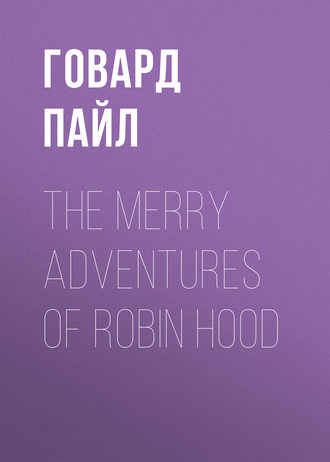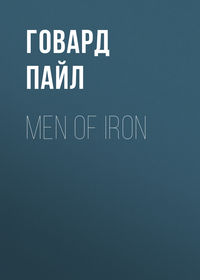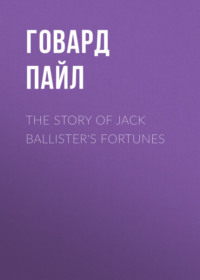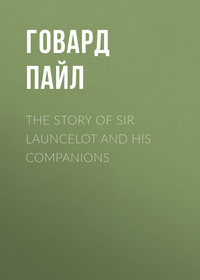 полная версия
полная версияThe Merry Adventures of Robin Hood
Then presently the director of the sport cried, "Play!" and they came together again; but now Eric played warily, for he found his man was of right good mettle, and also he had no sweet memory of the blow that he had got; so this bout neither Little John nor the Lincoln man caught a stroke within his guard. Then, after a while, they parted again, and this made the second bout.
Then for the third time they came together, and at first Eric strove to be wary, as he had been before; but, growing mad at finding himself so foiled, he lost his wits and began to rain blows so fiercely and so fast that they rattled like hail on penthouse roof; but, in spite of all, he did not reach within Little John's guard. Then at last Little John saw his chance and seized it right cleverly. Once more, with a quick blow, he rapped Eric beside the head, and ere he could regain himself, Little John slipped his right hand down to his left and, with a swinging blow, smote the other so sorely upon the crown that down he fell as though he would never move again.
Then the people shouted so loud that folk came running from all about to see what was the ado; while Little John leaped down from the stand and gave the staff back to him that had lent it to him. And thus ended the famous bout between Little John and Eric o' Lincoln of great renown.
But now the time had come when those who were to shoot with the longbow were to take their places, so the people began flocking to the butts where the shooting was to be. Near the target, in a good place, sat the Sheriff upon a raised dais, with many gentlefolk around him. When the archers had taken their places, the herald came forward and proclaimed the rules of the game, and how each should shoot three shots, and to him that should shoot the best the prize of two fat steers was to belong. A score of brave shots were gathered there, and among them some of the keenest hands at the longbow in Lincoln and Nottinghamshire; and among them Little John stood taller than all the rest. "Who is yon stranger clad all in scarlet?" said some, and others answered, "It is he that hath but now so soundly cracked the crown of Eric o' Lincoln." Thus the people talked among themselves, until at last it reached even the Sheriff's ears.
And now each man stepped forward and shot in turn; but though each shot well, Little John was the best of all, for three times he struck the clout, and once only the length of a barleycorn from the center. "Hey for the tall archer!" shouted the crowd, and some among them shouted, "Hey for Reynold Greenleaf!" for this was the name that Little John had called himself that day.
Then the Sheriff stepped down from the raised seat and came to where the archers stood, while all doffed their caps that saw him coming. He looked keenly at Little John but did not know him, though he said, after a while, "How now, good fellow, methinks there is that about thy face that I have seen erewhile."
"Mayhap it may be so," quoth Little John, "for often have I seen Your Worship." And, as he spoke, he looked steadily into the Sheriff's eyes so that the latter did not suspect who he was.
"A brave blade art thou, good friend," said the Sheriff, "and I hear that thou hast well upheld the skill of Nottinghamshire against that of Lincoln this day. What may be thy name, good fellow?"
"Men do call me Reynold Greenleaf, Your Worship," said Little John; and the old ballad that tells of this, adds, "So, in truth, was he a green leaf, but of what manner of tree the Sheriff wotted not."
"Now, Reynold Greenleaf," quoth the Sheriff, "thou art the fairest hand at the longbow that mine eyes ever beheld, next to that false knave, Robin Hood, from whose wiles Heaven forfend me! Wilt thou join my service, good fellow? Thou shalt be paid right well, for three suits of clothes shalt thou have a year, with good food and as much ale as thou canst drink; and, besides this, I will pay thee forty marks each Michaelmastide."
"Then here stand I a free man, and right gladly will I enter thy household," said Little John, for he thought he might find some merry jest, should he enter the Sheriff's service.
"Fairly hast thou won the fat steers," said the Sheriff, "and hereunto I will add a butt of good March beer, for joy of having gotten such a man; for, I wot, thou shootest as fair a shaft as Robin Hood himself."
"Then," said Little John, "for joy of having gotten myself into thy service, I will give fat steers and brown ale to all these good folk, to make them merry withal." At this arose a great shout, many casting their caps aloft, for joy of the gift.
Then some built great fires and roasted the steers, and others broached the butt of ale, with which all made themselves merry. Then, when they had eaten and drunk as much as they could, and when the day faded and the great moon arose, all red and round, over the spires and towers of Nottingham Town, they joined hands and danced around the fires, to the music of bagpipes and harps. But long before this merrymaking had begun, the Sheriff and his new servant Reynold Greenleaf were in the Castle of Nottingham.
How Little John Lived at the Sheriff's
THUS LITTLE JOHN entered into the Sheriff's service and found the life he led there easy enough, for the Sheriff made him his right-hand man and held him in great favor. He sat nigh the Sheriff at meat, and he ran beside his horse when he went a-hunting; so that, what with hunting and hawking a little, and eating rich dishes and drinking good sack, and sleeping until late hours in the morning, he grew as fat as a stall-fed ox. Thus things floated easily along with the tide, until one day when the Sheriff went a-hunting, there happened that which broke the smooth surface of things.
This morning the Sheriff and many of his men set forth to meet certain lords, to go a-hunting. He looked all about him for his good man, Reynold Greenleaf, but, not finding him, was vexed, for he wished to show Little John's skill to his noble friends. As for Little John, he lay abed, snoring lustily, till the sun was high in the heavens. At last he opened his eyes and looked about him but did not move to arise. Brightly shone the sun in at the window, and all the air was sweet with the scent of woodbine that hung in sprays about the wall without, for the cold winter was past and spring was come again, and Little John lay still, thinking how sweet was everything on this fair morn. Just then he heard, faint and far away, a distant bugle note sounding thin and clear. The sound was small, but, like a little pebble dropped into a glassy fountain, it broke all the smooth surface of his thoughts, until his whole soul was filled with disturbance. His spirit seemed to awaken from its sluggishness, and his memory brought back to him all the merry greenwood life – how the birds were singing blithely there this bright morning, and how his loved companions and friends were feasting and making merry, or perhaps talking of him with sober speech; for when he first entered the Sheriff's service he did so in jest; but the hearthstone was warm during the winter, and the fare was full, and so he had abided, putting off from day to day his going back to Sherwood, until six long months had passed. But now he thought of his good master and of Will Stutely, whom he loved better than anyone in all the world, and of young David of Doncaster, whom he had trained so well in all manly sports, till there came over his heart a great and bitter longing for them all, so that his eyes filled with tears. Then he said aloud, "Here I grow fat like a stall-fed ox and all my manliness departeth from me while I become a sluggard and dolt. But I will arouse me and go back to mine own dear friends once more, and never will I leave them again till life doth leave my lips." So saying, he leaped from bed, for he hated his sluggishness now.
When he came downstairs he saw the Steward standing near the pantry door – a great, fat man, with a huge bundle of keys hanging to his girdle. Then Little John said, "Ho, Master Steward, a hungry man am I, for nought have I had for all this blessed morn. Therefore, give me to eat."
Then the Steward looked grimly at him and rattled the keys in his girdle, for he hated Little John because he had found favor with the Sheriff. "So, Master Reynold Greenleaf, thou art anhungered, art thou?" quoth he. "But, fair youth, if thou livest long enough, thou wilt find that he who getteth overmuch sleep for an idle head goeth with an empty stomach. For what sayeth the old saw, Master Greenleaf? Is it not 'The late fowl findeth but ill faring'?"
"Now, thou great purse of fat!" cried Little John, "I ask thee not for fool's wisdom, but for bread and meat. Who art thou, that thou shouldst deny me to eat? By Saint Dunstan, thou hadst best tell me where my breakfast is, if thou wouldst save broken bones!"
"Thy breakfast, Master Fireblaze, is in the pantry," answered the Steward.
"Then fetch it hither!" cried Little John, who waxed angry by this time.
"Go thou and fetch it thine own self," quoth the Steward. "Am I thy slave, to fetch and carry for thee?"
"I say, go thou, bring it me!"
"I say, go thou, fetch it for thyself!"
"Ay, marry, that will I, right quickly!" quoth Little John in a rage. And, so saying, he strode to the pantry and tried to open the door but found it locked, whereat the Steward laughed and rattled his keys. Then the wrath of Little John boiled over, and, lifting his clenched fist, he smote the pantry door, bursting out three panels and making so large an opening that he could easily stoop and walk through it.
When the Steward saw what was done, he waxed mad with rage; and, as Little John stooped to look within the pantry, he seized him from behind by the nape of the neck, pinching him sorely and smiting him over the head with his keys till the yeoman's ears rang again. At this Little John turned upon the Steward and smote him such a buffet that the fat man fell to the floor and lay there as though he would never move again. "There," quoth Little John, "think well of that stroke and never keep a good breakfast from a hungry man again."
So saying, he crept into the pantry and looked about him to see if he could find something to appease his hunger. He saw a great venison pasty and two roasted capons, beside which was a platter of plover's eggs; moreover, there was a flask of sack and one of canary – a sweet sight to a hungry man. These he took down from the shelves and placed upon a sideboard, and prepared to make himself merry.
Now the Cook, in the kitchen across the courtyard, heard the loud talking between Little John and the Steward, and also the blow that Little John struck the other, so he came running across the court and up the stairway to where the Steward's pantry was, bearing in his hands the spit with the roast still upon it. Meanwhile the Steward had gathered his wits about him and risen to his feet, so that when the Cook came to the Steward's pantry he saw him glowering through the broken door at Little John, who was making ready for a good repast, as one dog glowers at another that has a bone. When the Steward saw the Cook, he came to him, and, putting one arm over his shoulder, "Alas, sweet friend!" quoth he – for the Cook was a tall, stout man – "seest thou what that vile knave Reynold Greenleaf hath done? He hath broken in upon our master's goods, and hath smitten me a buffet upon the ear, so that I thought I was dead. Good Cook, I love thee well, and thou shalt have a good pottle of our master's best wine every day, for thou art an old and faithful servant. Also, good Cook, I have ten shillings that I mean to give as a gift to thee. But hatest thou not to see a vile upstart like this Reynold Greenleaf taking it upon him so bravely?"
"Ay, marry, that do I," quoth the Cook boldly, for he liked the Steward because of his talk of the wine and of the ten shillings. "Get thee gone straightway to thy room, and I will bring out this knave by his ears." So saying, he laid aside his spit and drew the sword that hung by his side; whereupon the Steward left as quickly as he could, for he hated the sight of naked steel.
Then the Cook walked straightway to the broken pantry door, through which he saw Little John tucking a napkin beneath his chin and preparing to make himself merry.
"Why, how now, Reynold Greenleaf?" said the Cook, "thou art no better than a thief, I wot. Come thou straight forth, man, or I will carve thee as I would carve a sucking pig."
"Nay, good Cook, bear thou thyself more seemingly, or else I will come forth to thy dole. At most times I am as a yearling lamb, but when one cometh between me and my meat, I am a raging lion, as it were."
"Lion or no lion," quoth the valorous Cook, "come thou straight forth, else thou art a coward heart as well as a knavish thief."
"Ha!" cried Little John, "coward's name have I never had; so, look to thyself, good Cook, for I come forth straight, the roaring lion I did speak of but now."
Then he, too, drew his sword and came out of the pantry; then, putting themselves into position, they came slowly together, with grim and angry looks; but suddenly Little John lowered his point. "Hold, good Cook!" said he. "Now, I bethink me it were ill of us to fight with good victuals standing so nigh, and such a feast as would befit two stout fellows such as we are. Marry, good friend, I think we should enjoy this fair feast ere we fight. What sayest thou, jolly Cook?"
At this speech the Cook looked up and down, scratching his head in doubt, for he loved good feasting. At last he drew a long breath and said to Little John, "Well, good friend, I like thy plan right well; so, pretty boy, say I, let us feast, with all my heart, for one of us may sup in Paradise before nightfall."
So each thrust his sword back into the scabbard and entered the pantry. Then, after they had seated themselves, Little John drew his dagger and thrust it into the pie. "A hungry man must be fed," quoth he, "so, sweet chuck, I help myself without leave." But the Cook did not lag far behind, for straightway his hands also were deeply thrust within the goodly pasty. After this, neither of them spoke further, but used their teeth to better purpose. But though neither spoke, they looked at one another, each thinking within himself that he had never seen a more lusty fellow than the one across the board.
At last, after a long time had passed, the Cook drew a full, deep breath, as though of much regret, and wiped his hands upon the napkin, for he could eat no more. Little John, also, had enough, for he pushed the pasty aside, as though he would say, "I want thee by me no more, good friend." Then he took the pottle of sack, and said he, "Now, good fellow, I swear by all that is bright, that thou art the stoutest companion at eating that ever I had. Lo! I drink thy health." So saying, he clapped the flask to his lips and cast his eyes aloft, while the good wine flooded his throat. Then he passed the pottle to the Cook, who also said, "Lo, I drink thy health, sweet fellow!" Nor was he behind Little John in drinking any more than in eating.
"Now," quoth Little John, "thy voice is right round and sweet, jolly lad. I doubt not thou canst sing a ballad most blithely; canst thou not?"
"Truly, I have trolled one now and then," quoth the Cook, "yet I would not sing alone."
"Nay, truly," said Little John, "that were but ill courtesy. Strike up thy ditty, and I will afterward sing one to match it, if I can.
"So be it, pretty boy," quoth the Cook. "And hast thou e'er heard the song of the Deserted Shepherdess?"
"Truly, I know not," answered Little John, "but sing thou and let me hear."
Then the Cook took another draught from the pottle, and, clearing his throat, sang right sweetly:
THE SONG OF THE DESERTED SHEPHERDESS"In Lententime, when leaves wax green,And pretty birds begin to mate,When lark cloth sing, and thrush, I ween,And stockdove cooeth soon and late,Fair Phillis sat beside a stone,And thus I heard her make her moan:'O willow, willow, willow, willow!I'll take me of thy branches fairAnd twine a wreath to deck my hair."'The thrush hath taken him a she,The robin, too, and eke the dove;My Robin hath deserted me,And left me for another love.So here, by brookside, all alone,I sit me down and make my moan.O willow, willow, willow, willow!I'll take me of thy branches fairAnd twine a wreath to deck my hair.'"But ne'er came herring from the sea,But good as he were in the tide;Young Corydon came o'er the lea,And sat him Phillis down beside.So, presently, she changed her tone,And 'gan to cease her from her moan,'O willow, willow, willow, willow!Thou mayst e'en keep thy garlands fair,I want them not to deck my hair.'""Now, by my faith," cried Little John, "that same is a right good song, and hath truth in it, also."
"Glad am I thou likest it, sweet lad," said the Cook. "Now sing thou one also, for ne'er should a man be merry alone, or sing and list not."
"Then I will sing thee a song of a right good knight of Arthur's court, and how he cured his heart's wound without running upon the dart again, as did thy Phillis; for I wot she did but cure one smart by giving herself another. So, list thou while I sing:
THE GOOD KNIGHT AND HIS LOVE"When Arthur, King, did rule this land,A goodly king was he,And had he of stout knights a bandOf merry company."Among them all, both great and small,A good stout knight was there,A lusty childe, and eke a tall,That loved a lady fair."But nought would she to do with he,But turned her face away;So gat he gone to far countrye,And left that lady gay."There all alone he made his moan,And eke did sob and sigh,And weep till it would move a stone,And he was like to die."But still his heart did feel the smart,And eke the dire distress,And rather grew his pain more sharpAs grew his body less."Then gat he back where was good sackAnd merry com panye,And soon did cease to cry 'Alack!'When blithe and gay was he."From which I hold, and feel full boldTo say, and eke believe,That gin the belly go not coldThe heart will cease to grieve.""Now, by my faith," cried the Cook, as he rattled the pottle against the sideboard, "I like that same song hugely, and eke the motive of it, which lieth like a sweet kernel in a hazelnut"
"Now thou art a man of shrewd opinions," quoth Little John, "and I love thee truly as thou wert my brother."
"And I love thee, too. But the day draweth on, and I have my cooking to do ere our master cometh home; so let us e'en go and settle this brave fight we have in hand."
"Ay, marry," quoth Little John, "and that right speedily. Never have I been more laggard in fighting than in eating and drinking. So come thou straight forth into the passageway, where there is good room to swing a sword, and I will try to serve thee."
Then they both stepped forth into the broad passage that led to the Steward's pantry, where each man drew his sword again and without more ado fell upon the other as though he would hew his fellow limb from limb. Then their swords clashed upon one another with great din, and sparks flew from each blow in showers. So they fought up and down the hall for an hour and more, neither striking the other a blow, though they strove their best to do so; for both were skillful at the fence; so nothing came of all their labor. Ever and anon they rested, panting; then, after getting their wind, at it they would go again more fiercely than ever. At last Little John cried aloud, "Hold, good Cook!" whereupon each rested upon his sword, panting.
"Now will I make my vow," quoth Little John, "thou art the very best swordsman that ever mine eyes beheld. Truly, I had thought to carve thee ere now."
"And I had thought to do the same by thee," quoth the Cook, "but I have missed the mark somehow."
"Now I have been thinking within myself," quoth Little John, "what we are fighting for; but albeit I do not rightly know."
"Why, no more do I," said the Cook. "I bear no love for that pursy Steward, but I thought that we had engaged to fight with one another and that it must be done."
"Now," quoth Little John, "it doth seem to me that instead of striving to cut one another's throats, it were better for us to be boon companions. What sayst thou, jolly Cook, wilt thou go with me to Sherwood Forest and join with Robin Hood's band? Thou shalt live a merry life within the woodlands, and sevenscore good companions shalt thou have, one of whom is mine own self. Thou shalt have three suits of Lincoln green each year, and forty marks in pay."
"Now, thou art a man after mine own heart!" cried the Cook right heartily, "and, as thou speakest of it, that is the very service for me. I will go with thee, and that right gladly. Give me thy palm, sweet fellow, and I will be thine own companion from henceforth. What may be thy name, lad?"
"Men do call me Little John, good fellow."
"How? And art thou indeed Little John, and Robin Hood's own right-hand man? Many a time and oft I heard of thee, but never did I hope to set eyes upon thee. And thou art indeed the famous Little John!" And the Cook seemed lost in amazement, and looked upon his companion with open eyes.
"I am Little John, indeed, and I will bring to Robin Hood this day a right stout fellow to join his merry band. But ere we go, good friend, it seemeth to me to be a vast pity that, as we have had so much of the Sheriff's food, we should not also carry off some of his silver plate to Robin Hood, as a present from his worship."
"Ay, marry is it," said the Cook. And so they began hunting about, and took as much silver as they could lay hands upon, clapping it into a bag, and when they had filled the sack they set forth to Sherwood Forest.
Plunging into the woods, they came at last to the greenwood tree, where they found Robin Hood and threescore of his merry men lying upon the fresh green grass. When Robin and his men saw who it was that came, they leaped to their feet. "Now welcome!" cried Robin Hood. "Now welcome, Little John! For long hath it been since we have heard from thee, though we all knew that thou hadst joined the Sheriff's service. And how hast thou fared all these long days?"
"Right merrily have I lived at the Lord Sheriff's," answered Little John, "and I have come straight thence. See, good master! I have brought thee his cook, and even his silver plate." Thereupon he told Robin Hood and his merry men that were there, all that had befallen him since he had left them to go to the Fair at Nottingham Town. Then all shouted with laughter, except Robin Hood; but he looked grave.
"Nay, Little John," said he, "thou art a brave blade and a trusty fellow. I am glad thou hast brought thyself back to us, and with such a good companion as the Cook, whom we all welcome to Sherwood. But I like not so well that thou hast stolen the Sheriff's plate like some paltry thief. The Sheriff hath been punished by us, and hath lost three hundred pounds, even as he sought to despoil another; but he hath done nought that we should steal his household plate from him."
Though Little John was vexed with this, he strove to pass it off with a jest. "Nay, good master," quoth he, "if thou thinkest the Sheriff gave us not the plate, I will fetch him, that he may tell us with his own lips he giveth it all to us." So saying he leaped to his feet, and was gone before Robin could call him back.
Little John ran for full five miles till he came to where the Sheriff of Nottingham and a gay company were hunting near the forest. When Little John came to the Sheriff he doffed his cap and bent his knee. "God save thee, good master," quoth he.
"Why, Reynold Greenleaf!" cried the Sheriff, "whence comest thou and where hast thou been?"
"I have been in the forest," answered Little John, speaking amazedly, "and there I saw a sight such as ne'er before man's eyes beheld! Yonder I saw a young hart all in green from top to toe, and about him was a herd of threescore deer, and they, too, were all of green from head to foot. Yet I dared not shoot, good master, for fear lest they should slay me."
"Why, how now, Reynold Greenleaf," cried the Sheriff, "art thou dreaming or art thou mad, that thou dost bring me such, a tale?"
"Nay, I am not dreaming nor am I mad," said Little John, "and if thou wilt come with me, I will show thee this fair sight, for I have seen it with mine own eyes. But thou must come alone, good master, lest the others frighten them and they get away."
So the party all rode forward, and Little John led them downward into the forest.









